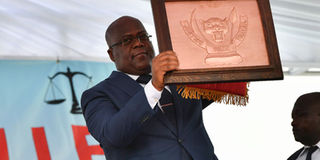Tshisekedi: DRC president on a leash

Sworn-in. DR Congo’s newly inaugurated president Felix Tshisekedi raises an official plaque of the presidency after he took an oath of office in Kinshasa on Thursday. AFP PHOTO
What you need to know:
Oath of office. Opposition leader Felix Tshisekedi was sworn in on Thursday as president of DR Congo, marking the country’s first peaceful handover of power.
After a long struggle, the people have (kind of but not really) got what they want with president Joseph Kabila (kind of but not really) conceding power.
When Felix Tshisekedi took oath on Thursday, he became the Democratic Republic of Congo’s (DRC) fifth president. His inauguration marked the country’s first peaceful democratic transition of power – and to an opposition leader at that.
On paper, this is a textbook example of successful democratisation. But that narrative is undermined somewhat by the fact that Tshisekedi was almost certainly not the true victor of the December 2018 elections.
In many ways, a Tshisekedi victory was the outcome no one was expecting. Outgoing president Joseph Kabila has spent the last few years clinging onto power.
Some suspected Kabila would still find a way to run, but as the vote approached, the presidential majority known as the Front Commun pour le Congo (FCC) nominated Shadary as its candidate. The plan was presumably to use its extensive power and oversight over the electoral process to ensure his victory and the continuation of Kabila’s rein by proxy.
But Shadary proved so unpopular that even with heavy manipulation, it would have been impossible to declare him the winner without triggering mass protests. By contrast, Fayulu gained the backing of several opposition parties and soared in the polls. Faced with this conundrum, it is widely believed that Kabila improvised a deal.
He couldn’t install his own hand-picked candidate, so came up with an arrangement with Tshisekedi instead. The regime conceded the presidency to the second-placed opposition leader, but managed to keep Fayulu – and crucially his powerful supporters in former vice-president Jean-Pierre Bemba and former Katanga governor Moise Katumbi – out of power.
On a leash
Nonetheless, after 18 years in office, the deeply unpopular president Kabila is finally stepping down. Yet below the surface of this monumental shift, much has not changed. The FCC maintains its firm grip on power.
In December 2018, the Congolese people did not only vote for a new president, but for members of the national parliament and provincial assemblies. And to everyone’s surprise – or maybe not – the ruling FCC won overwhelmingly, significantly strengthening its majority by picking up 350 of the DRC’s 500 parliamentary seats. Tshisekedi’s Union pour la Démocratie et le Progrès Social (UDPS) won just 49, or less than 10 per cent of the total. The FCC also won the largest number of seats in all 26 provincial councils. This means it can elect all the country’s governors, giving it a monopoly on decision-making and access to financial resources at this level.
President Tshisekedi will also find his powers stymied in other respects. The army top brass is made up of key Kabila allies, installed a few months ago. And the powerful patronage networks that gravitate around Kabila remain in place. Tshisekedi’s team may try to break this up, but will find it tough-going.
The FCC will be reluctant to offer the new president and his vice-president Vital Kamerhe much more than crumbs. It may offer up some key managerial posts in parastatals, giving up access to some public finances, and oversight of some minor ministries. But strategic positions such as security, foreign affairs and the economy will most likely remain under the close watch of the regime.
The outgoing president may also have a final card up his sleeve to keep a leash on his successor. Rumours have been circulating for months that Tshisekedi included a faked diploma from an institute in Brussels in his registration to run for president.
Last week, it emerged that the Congolese courts had asked the Belgian state to examine the document, which it confirmed was fake a month before the elections. This opens up the possibility that the DRC’s constitutional court could choose to impeach Tshisekedi at any time.
Tensions and paradoxes
Beyond Tshisekedi’s paradoxically tenuous presidential position, the elections have introduced many other new contradictions into the DRC’s political system.
There are fresh tensions within the FCC itself, for example. Many local strongmen claim the parliamentary elections were rigged too and that their seats were given to national heavyweights as part of some high-level deals by the regime. These disgruntled figures have been left to protest or simply leave the ruling coalition.
The internal cohesion of Tshisekedi and Kamerhe’s coalition known as CACH is not high neither. The new president and vice-president have a bad personal relationship.
And finally of course, there is the widespread frustration and growing mistrust among the 60 per cent of the electorate that voted for Fayulu.
Watching on from outside the Congo, African institutions also face a fascinating dilemma. Above all, they fear the negative impacts that instability in the DRC could cause for their own domestic situations. This is what motivated them since 2016 to put pressure on Kabila to step down and why they are now in a complicated bind.
RESULTS
According to official results from the electoral commission (CENI), Tshisekedi won with 38.6 per cent of the vote; opposition leader Martin Fayulu came in second with 34.8 per cent; and the regime’s candidate Emmanuel Ramazani Shadary was third with 23.8 per cent.
But these tallies vary hugely with both leaked numbers from CENI’s computers and data collected by the Catholic Bishops’ Conference’s 40,000 observers.
africanarguments.org




